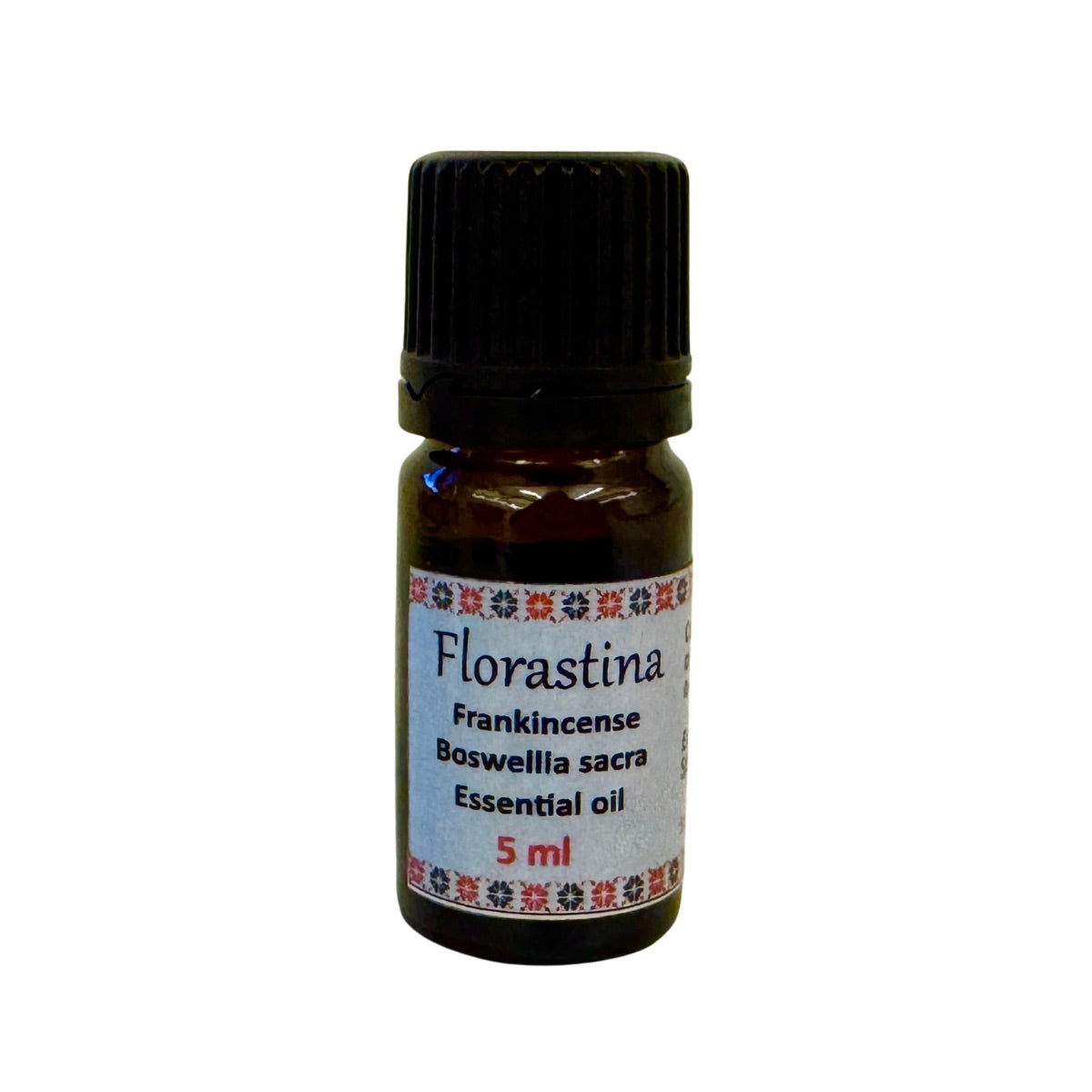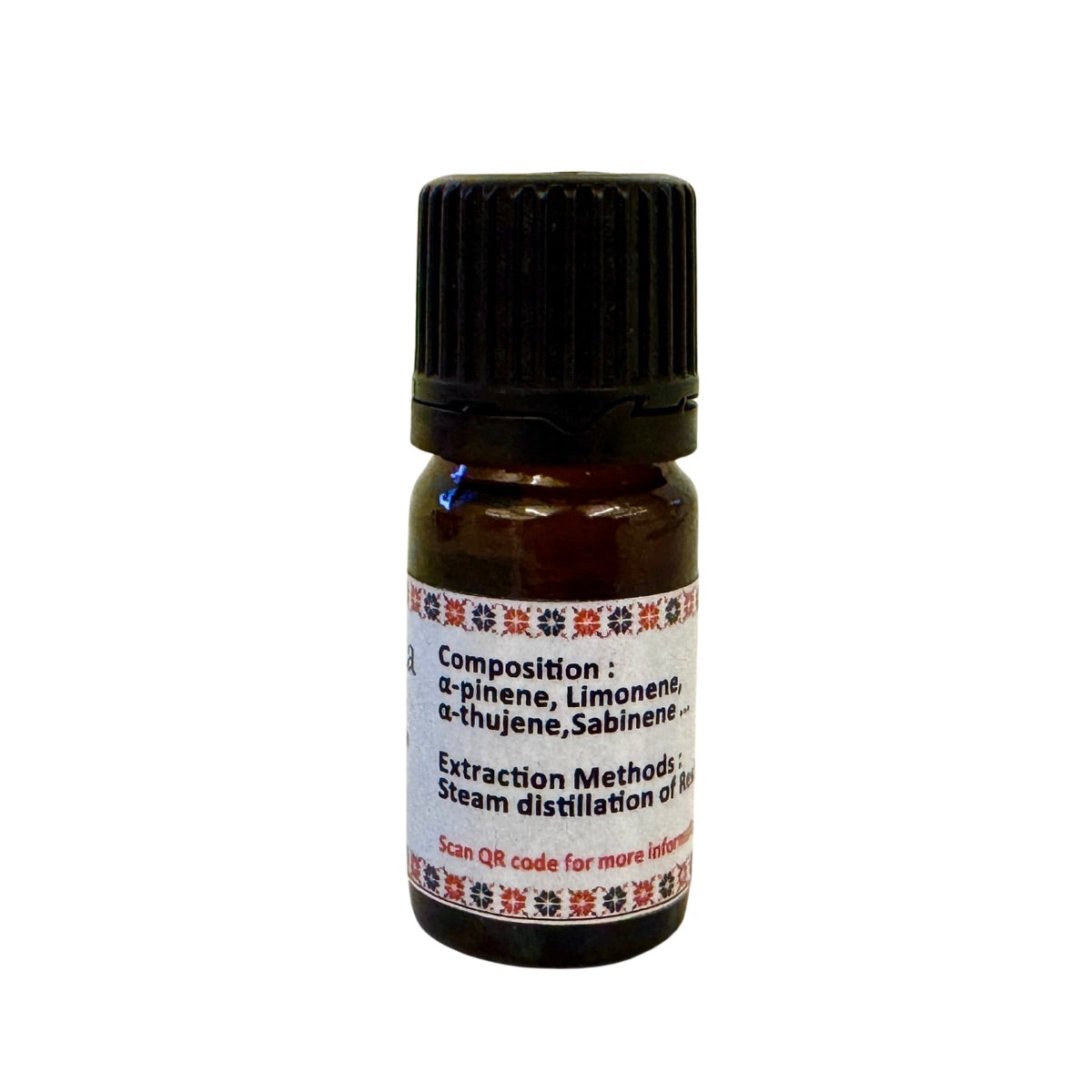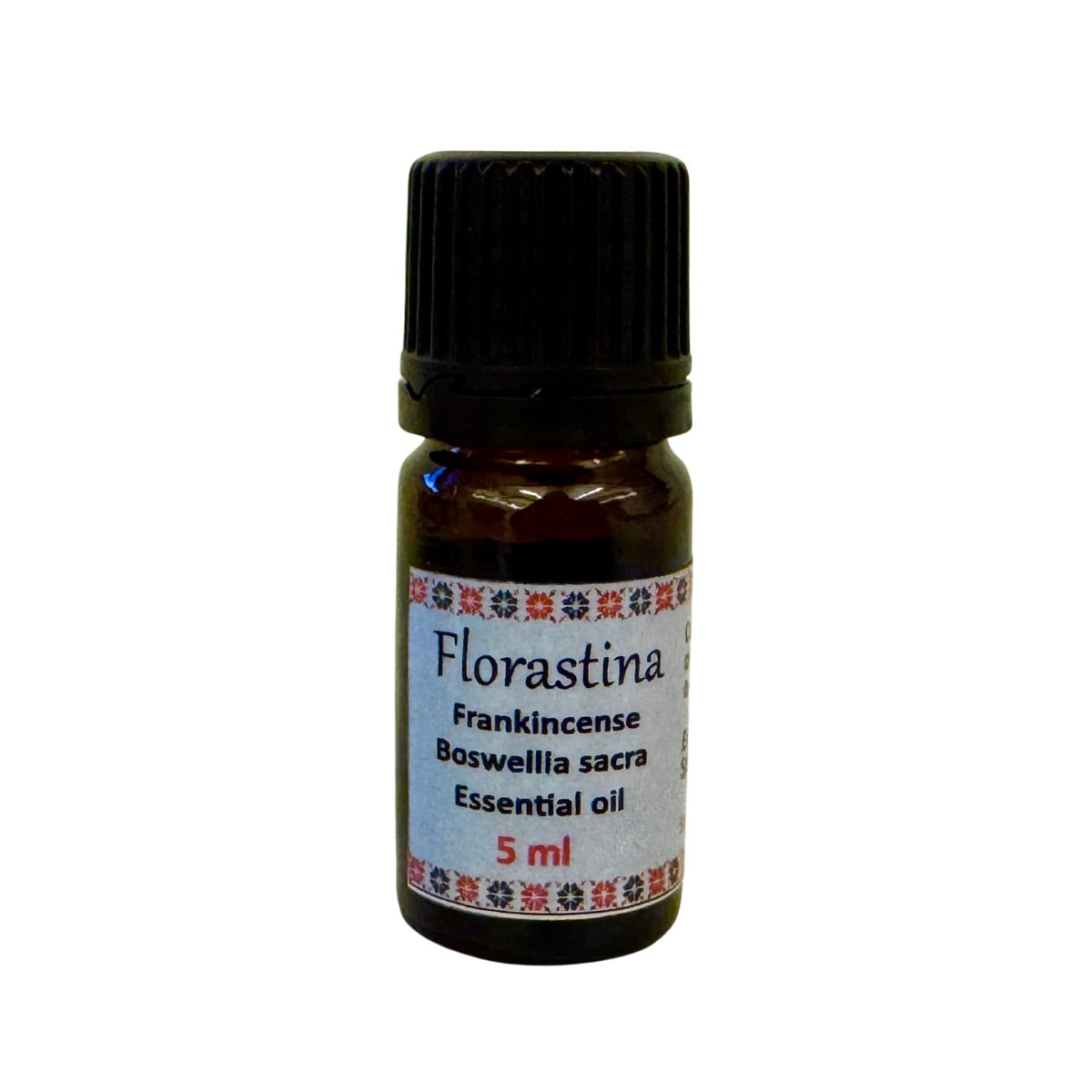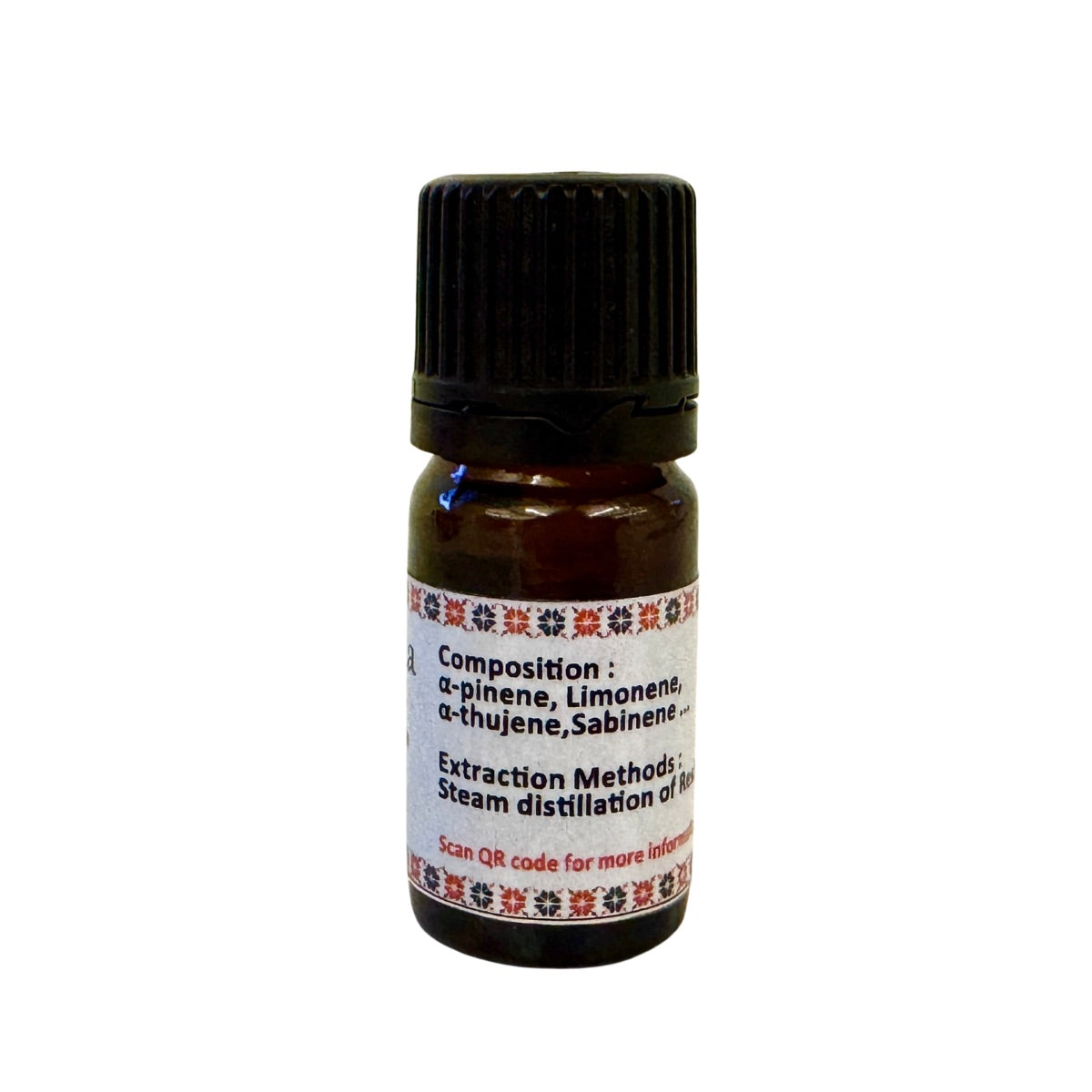PaliNova
Florestina Essential Oil - Frankincense (5ml)
SKU: MIO317Florestina Essential Oil - Frankincense (5ml)
Pickup available at Shop Palestine Office - MECA
Usually ready in 5+ days
Frankincense, derived from the resin of the Boswellia tree, is traditionally native to regions such as northern Somalia, Yemen, and Oman. However, there have been efforts to cultivate frankincense trees in Palestine, particularly in areas between Jerusalem and the Dead Sea. These efforts are part of broader initiatives to restore biblical plants in the region.
-
This essential oil is extracted from Boswellia sacra resin and it is free from any pollutants or unnatural substances. Where the distillation process was carried out to collect the maximum amount of aromatic substances from the resin.
-
What distinguishes this product from others: it contains the smell of the Boswellia.
Aromatic Profile & Blending
-
The aromatic profile of Frankincense essential oil is characterized by a strong initial aroma with a pleasant and distinctive scent.
-
It has a warm and spicy fragrance that is often described as woody and balsamic.
When it comes to blending Frankincense essential oil, it combines well with various other oils, creating unique and harmonious scent combinations. Some oils that blend well with Frankincense include:
1. Citrus oils such as Bergamot oil, Grapefruit oil, and Neroli oil: These citrus oils add a fresh and uplifting note to the warm and spicy aroma of Frankincense.
2. Conifer oils such as Cedarwood oil: Cedarwood oil has a woody and earthy scent that complements the woody notes of Frankincense, creating a balanced and grounding blend.
3. Eucalyptus oil: Eucalyptus oil adds a refreshing and cooling element to the warm and spicy aroma of Frankincense, creating a unique and invigorating blend.
4. Rosemary oil: Rosemary oil has a herbaceous and slightly camphoraceous scent that pairs well with the warm and spicy notes of Frankincense, creating a stimulating and revitalizing blend.
5. Sage oil: Sage oil has a fresh and herbaceous scent that complements the warm and spicy aroma of Frankincense, adding depth and complexity to the blend
6. Lavender oil: Lavender oil has a floral and calming scent that blends harmoniously with the warm and spicy notes of Frankincense, creating a soothing and relaxing blend.
These are just a few examples of oils that blend well with Frankincense. The possibilities for creating unique and personalized blends are endless. It is always recommended to experiment with different combinations and ratios to find the perfect blend that suits your preferences and needs.
-
Please note that before using any essential oil, including Frankincense, it is important to dilute it properly and perform a patch test to ensure that you do not have any adverse reactions.
-
Additionally, if you have any specific medical conditions or concerns, it is advisable to seek advice from a professional aromatherapist or healthcare provider before using essential oils therapeutically
Health Benefits
Frankincense oil, is a powerful essential oil that has a long history in traditional medicineFrankincense oil has been used to help manage various health conditions, and there are several science-backed benefits associated with its use.
-
Anti-inflammatory effects: Frankincense oil has been found to have anti-inflammatory effects that may help reduce joint inflammation caused by arthritis. The terpenes and boswellic acid present in frankincense oil, especially boswellic acid, are believed to be the compounds responsible for its anti-inflammatory properties. Studies have shown that frankincense extract may help reduce symptoms of osteoarthritis and rheumatoid arthritis in humans. However, more high-quality research is needed to further confirm these effects.
-
Gut health: Frankincense oil has been shown to have positive effects on gut health. It has been used as part of a treatment for irritable bowel syndrome (IBS) and ulcerative colitis. Studies have found that frankincense, when used in combination with other herbal medicines, reduced symptoms of IBS, including abdominal pain, bloating, and associated depression and anxiety. It also appears to be effective in reducing symptoms of ulcerative colitis. However, more research is needed to fully understand its effects on gut health.
-
Asthma relief: Frankincense oil has traditionally been used to treat bronchitis and asthma. Research suggests that the compounds in frankincense oil may help prevent the production of leukotrienes, which cause the bronchial muscles to constrict in asthma. It may also affect The cytokines, which can cause inflammation and mucus overproduction in people with asthma. Some studies have shown that frankincense oil can help reduce asthma symptoms and the amount of medication needed in both humans and animals.
-
Oral health: The antibacterial properties of frankincense oil make it useful for maintaining oral hygiene and preventing gum disease. It has been found to be effective against bacteria that cause gum disease. Chewing gum containing frankincense oil has also been shown to reduce the number of bacteria in the mouth. However, more research is needed to fully understand the effects of frankincense oil on oral health.
-
Anticancer properties: Test-tube studies have suggested that frankincense oil may have anticancer effects. The Boswellia acids found in frankincense oil have been found to prevent the spread of cancer cells and inhibit the formation of DNA in cancerous cells. These effects have been observed in test-tube studies on breast, prostate, pancreatic, skin, and colon cancer cells. However, more research, particularly in humans, is needed to confirm these effects.
It is important to note that while frankincense oil is praised for its potential health benefits, not all of its uses are backed by scientific research. Claims such as its ability to prevent diabetes, reduce stress and anxiety, prevent heart disease, improve memory, and balance hormones have very little evidence to support them. More research is needed to understand the full range of potential benefits and uses of frankincense oil.
Frankincense oil can be used in several ways, including as a supplement, in skin creams, or inhaled as an essential oil for aromatherapy purposes. It is generally safe to use, but it is important to talk to a healthcare professional before using it, especially if you are pregnant, nursing, or taking any medications.
When using frankincense oil as a supplement, the dosage can vary depending on the condition being treated. Studies have used dosages ranging from 200 to 500 mg per day for conditions such as asthma, IBS, and osteoarthritis.
In terms of safety, frankincense oil is considered safe for most people. However, there are some precautions to consider. It may cause skin sensitivity in some individuals, and it should be kept out of reach of children. Pregnant individuals or those trying to become pregnant may want to avoid frankincense oil, as there is some evidence to suggest it may increase the risk of miscarriage.
In conclusion, frankincense oil has several potential health benefits, including its anti-inflammatory effects, potential benefits for gut health, potential relief for asthma symptoms, oral health benefits, and possible anticancer effects. However, more research is needed to fully understand and confirm these effects. It is important to use frankincense oil under the guidance of a healthcare professional and to ensure its safety for your specific situation.
How To Use This Oil
Frankincense essential oil is a versatile oil that has many potential uses and benefits. Here are some ways you can use frankincense essential oil:
Meditation aid: Frankincense essential oil has a calming and grounding effect, which can help promote relaxation and focus during meditation. You can add a few drops to a diffuser or apply a diluted solution to your temples and neck before meditation.
Stress relief: Frankincense essential oil has analgesic properties that can help reduce stress and anxiety. It calms racing thoughts, promotes sleep, calms nerves, and can even help treat seizures. You can add a few drops to a diffuser or apply a diluted solution to your temples, wrists, or neck to promote a sense of peace.
Skincare: Frankincense oil has anti-inflammatory and antiseptic properties, making it a valuable ingredient in skincare products. It can help reduce the appearance of fine lines and wrinkles, improve skin elasticity, and promote a more youthful appearance.
To use frankincense oil for skin care, you can add it to a carrier oil like jojoba oil and apply it topically to the skin.
Scar healing: Frankincense oil can also help promote scar healing. It stimulates the growth of new skin cells, which can help fade the appearance of scars over time. To use for scar treatment, you can combine frankincense essential oil with a carrier oil like coconut or jojoba oil and apply it to scars twice daily.
Immune support: Frankincense oil has immune-boosting properties. It reduces inflammation in the body and has antiseptic properties that can help protect against harmful pathogens. To use it for immune support, you can apply it topically to the skin. It is important to dilute frankincense oil before applying it to the skin, as it can be too strong on its own.
Respiratory relief: Frankincense oil can be used as a natural alternative to traditional respiratory medications. It reduces inflammation in the airways and has expectorant properties that can help clear the airways and promote easier breathing. You can diffuse it throughout the day or put it in a personal inhaler.
Muscle and joint discomfort: Frankincense oil has anti-inflammatory properties that can help ease pain and symptoms of issues like arthritis or achy joints. You can mix frankincense essential oil with carrier oil and massage it into sore muscles or achy joints for relief and relaxation.
Hair care: Frankincense oil can strengthen hair, reduce dandruff and itchy scalp, reduce thinning, and promote hair growth. You can simply add one drop into shampoo with every wash.
Relaxing bath: Frankincense essential oil can be added to a bath to create a relaxing and healing experience. It helps soothe and restore irritated or damaged skin and can help reduce the appearance of age spots and acne blemishes. You can add a drop of frankincense to a bath bomb or use frankincense oil with Epsom salts for a relaxing bath.
Massage oil: Frankincense essential oil makes an excellent addition to massage oil. It helps with pain management, relaxation, skin rejuvenation, and overall wellness. You can add frankincense essential oil to a carrier oil like sweet almond or grapeseed oil and massage it into your body to unwind and relax.
It's important to note that essential oils are highly concentrated and should be used with caution. It's recommended to dilute them with a carrier oil before applying them to the skin. If you have any underlying medical conditions or are pregnant or breastfeeding, it's best to consult with a healthcare professional before using frankincense essential oil.
Please note that the information provided here is for informational purposes only and is not intended to be a substitute for professional medical advice, diagnosis, or treatment. Always seek the advice of your physician or other qualified health provider with any questions you may have regarding a medical condition.
Safety Considerations
Some important points to keep in mind when using frankincense essential oil:
-
Patch test: Before using frankincense oil topically, it is recommended to perform a patch test. Apply a small amount of diluted oil to a small area of the skin and wait for 24 hours to check for any signs of irritation or allergic reactions.
-
Dilute properly: Frankincense oil is highly concentrated and should always be diluted before applying it to the skin. Mix a few drops of frankincense oil with a carrier oil such as coconut oil or jojoba oil before using it topically.
-
Avoid ingesting: Frankincense essential oil should not be ingested in large quantities as it can be toxic. If you plan to use frankincense oil internally, consult with a healthcare professional and follow their recommendations.
-
Consult a healthcare professional: If you have any underlying health conditions or are taking any medications, it is advisable to consult a healthcare professional before using frankincense oil. They can provide personalized advice based on your specific situation.
-
Pregnancy and breastfeeding: It is generally recommended to avoid using frankincense essential oil during pregnancy and breastfeeding, as there is limited research on its safety in these situations. It is always best to consult a healthcare professional for guidance.
-
Allergic reactions: Although uncommon, some individuals may be allergic to frankincense oil. If you experience any signs of allergic reactions such as rash, itching, or swelling, discontinue use and seek medical attention if necessary.
The information provided is based on the research and expert opinions available. It is always recommended to conduct your own research and consult with a healthcare professional for personalized advice.




